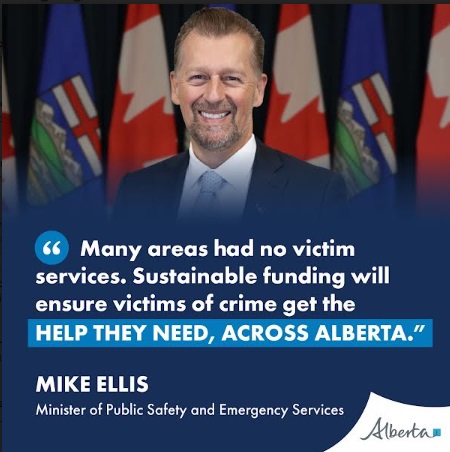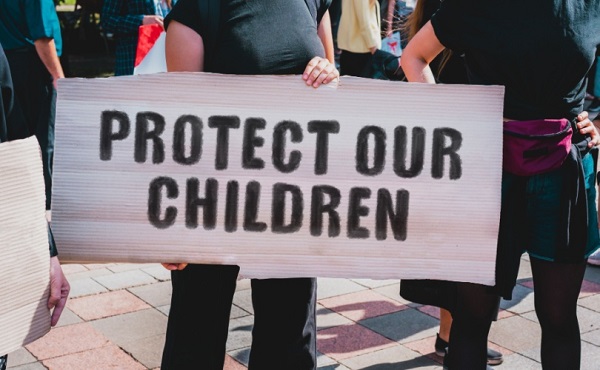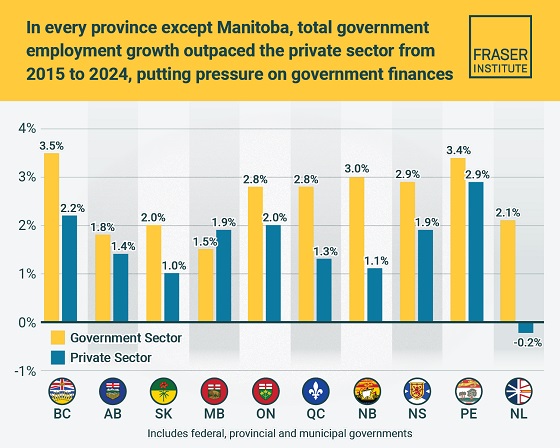Alberta
Province overhauls Victim Services model, creating regional hubs and full access

By Mike Ellis, Minister of Public Safety and Emergency Services
All victims of crime deserve support
Dealing with the aftermath of a crime can be challenging for victims, and everyone’s journey to recovery is different.
Alberta’s government is committed to making sure victims get the support they need, which is why we are changing how victim services currently operates to ensure every Albertan in every corner of the province will have access to the help they need when they need it.
Alberta’s government decision to overhaul the Victim Services Unit (VSU) model, with its 60 detachment-based and locally governed units, was made with careful consideration of the current challenges facing the system. A comprehensive review of the current system – one that included
discussions with 150 stakeholder groups – identified inconsistencies and gaps in services that had been developing over a long period of time and needed to be addressed.
Under the old model, 14 areas had no local victim services unit, which is why the new model being implemented by Alberta’s government ensures every RCMP detachment in the province will have access to consistent victim services.
That means if you were a victim of crime in a certain part of Alberta, you had no service. This was unacceptable.
Also, under the old model, each unit was operated by an independent society, which resulted in a lack of integration and resource-sharing. Under the new model, regional governance will ensure each community can draw on resources to keep their public services stable and consistent. To address these issues, we’re moving towards a regional governance model with four integrated Regional Victim Serving Societies.
These regional societies will help victims by increasing the reliability, of support across the province. This means that victims will have access to stable and consistent levels of care and assistance, regardless of their location. It’s a new approach that will allow for greater flexibility to deliver services at the community level where they are needed most.
With a renewed focus on the needs of victims, this approach will streamline operations, foster collaboration both within and across regions, and ensure all Albertans have fair access to critical victim services. As well, the changes mean that the total number of frontline employees will increase from 130 to 153, and both frontline employees and local volunteer advocates will have the resources and training necessary to better serve victims in their communities.
The regional societies are independent, and they make their own staffing decisions for the units in their regions.
The primary goal of these changes is to ensure that victims and survivors have access to the supports they need to recover and rebuild their lives in the aftermath of a crime or tragedy.
I have met with many municipalities and the Rural Municipalities of Alberta, and we have incorporated feedback into the redesign.
Airdrie Mayor Peter Brown supported the redesign and said, “We look forward to working with the new team, providing the same efficient, caring & compassionate service that supports our community at their most vulnerable times.”
Mayor Megan Hanson, from the Town of Sylvan Lake told me the redesign is a “Much-needed change.”
She said, “Under the previous Victims Services model, staff and volunteers in Sylvan Lake tried valiantly to provide and maintain supports for victims of crime but lacked adequate supports This shift to a new model is a positive and much-needed change for our community. A regional model helps to
pool resources and gives us confidence that victims in Sylvan Lake and across Alberta will receive the help they truly deserve.”
Alberta’s government is taking action so every community across our province will have access to the services and support.
To those who are victims of crime or tragedy, Alberta’s government will there regardless of where you live.
Alberta
New pipeline from Alberta would benefit all Canadians—despite claims from B.C. premier

From the Fraser Institute
The pending Memorandum of Understanding between the Carney government and the Alberta governments will reportedly support a new oil pipeline from Alberta’s oilsands to British Columbia’s tidewater. But B.C. Premier David Eby continues his increasingly strident—and factually challenged—opposition to the whole idea.
Eby’s arguments against a new pipeline are simply illogical and technically incorrect.
First, he argues that any pipeline would pose unmitigated risks to B.C.’s coastal environment, but this is wrong for several reasons. The history of oil transport off of Canada’s coasts is one of incredible safety, whether of Canadian or foreign origin, long predating federal Bill C-48’s tanker ban. New pipelines and additional transport of oil from (and along) B.C. coastal waters is likely very low environmental risk. In the meantime, a regular stream of oil tankers and large fuel-capacity ships have been cruising up and down the B.C. coast between Alaska and U.S. west coast ports for decades with great safety records.
Next, Eby argues that B.C.’s First Nations people oppose any such pipeline and will torpedo energy projects in B.C. But in reality, based on the history of the recently completed Trans Mountain Expansion (TMX) pipeline, First Nations opposition is quite contingent. The TMX project had signed 43 mutual benefit/participation agreements with Indigenous groups along its route by 2018, 33 of which were in B.C. As of March 2023, the project had signed agreements with 81 out of 129 Indigenous community groups along the route worth $657 million, and the project had resulted in more than $4.8 billion in contracts with Indigenous businesses.
Back in 2019, another proposed energy project garnered serious interest among First Nations groups. The First Nations-proposed Eagle Spirit Energy Corridor, aimed to connect Alberta’s oilpatch to a port in Kitimat, B.C. (and ultimately overseas markets) had the buy-in of 35 First Nations groups along the proposed corridor, with equity-sharing agreements floated with 400 others. Energy Spirit, unfortunately, died in regulatory strangulation in the Trudeau government’s revised environmental assessment process, and with the passage of the B.C. tanker ban.
Premier Eby is perfectly free to opine and oppose the very thought of oil pipelines crossing B.C. But the Supreme Court of Canada has already ruled in a case about the TMX pipeline that B.C. does not have the authority to block infrastructure of national importance such as pipelines.
And it’s unreasonable and corrosive to public policy in Canada for leading government figures to adopt positions on important elements of public policy that are simply false, in blatant contradiction to recorded history and fact. Fact—if the energy industry is allowed to move oil reserves to markets other than the United States, this would be in the economic interest of all Canadians including those in B.C.
It must be repeated. Premier Eby’s objections to another Alberta pipeline are rooted in fallacy, not fact, and should be discounted by the federal government as it plans an agreement that would enable a project of national importance.
Alberta
Premier Danielle Smith says attacks on Alberta’s pro-family laws ‘show we’ve succeeded in a lot of ways’

From LifeSiteNews
Recent legislation to dial back ‘woke progressivism’ is intended to protect the rights of parents and children despite opposition from the left.
Alberta Premier Danielle Smith took a shot at “woke progressivism” and detractors of her recent pro-family laws, noting that because wokeness went “too far,” the “dial” has turned in favor of parental rights and “no one” wants their “kid to transition behind their back.”
“We know that things went a little bit too far with woke progressivism on so many fronts and we’re trying to get back to the center, trying to get them back to the middle,” Smith said in a recent video message posted on the ruling United Conservative Party’s (UCP) official X account.
Smith, who has been battling the leftist opposition New Democratic Party (NDP) attacks on her recent pro-family legislation, noted how “we’ve succeeded in a lot of ways.”
“I think we have moved the dial on protecting children and the right of girls and women to participate in sports without having to face born male athletes,” mentioning that the Olympics just announced gender-confused athletes are not allowed to compete in male or female categories.
“I think we’re moving the dial on parental rights to make sure that they know what’s going on with their kids. No one wants their kid to be transitioned behind their back and not know. I mean, it doesn’t matter what your background is, you want to know what’s going on with your child.”
Smith also highlighted how conservatives have “changed the entire energy conversation in the country, we now have we now have more than 70 percent of Canadians saying they believe we should build pipelines, and that we should be an energy superpower.’
As reported by LifeSiteNews, Smith recently said her government will use a rare constitutional tool, the notwithstanding clause, to ensure three bills passed this year – a ban on transgender surgery for minors, stopping men from competing in women’s sports, and protecting kids from extreme aspects of the LGBT agenda – remain law after legal attacks from extremist activists.
Bill 26 was passed in December 2024, amending the Health Act to “prohibit regulated health professionals from performing sex reassignment surgeries on minors.”
Last year, Smith’s government also passed Bill 27, a law banning schools from hiding a child’s pronoun changes at school that will help protect kids from the extreme aspects of the LGBT agenda.
Bill 27 will also empower the education minister to, in effect, stop the spread of extreme forms of pro-LGBT ideology or anything else allowed to be taught in schools via third parties.
Bill 29, which became law last December, bans gender-confused men from competing in women’s sports, the first legislation of its kind in Canada. The law applies to all school boards, universities, and provincial sports organizations.
Alberta’s notwithstanding clause is like all other provinces’ clauses and was a condition Alberta agreed to before it signed onto the nation’s 1982 constitution.
-

 Artificial Intelligence1 day ago
Artificial Intelligence1 day agoGoogle denies scanning users’ email and attachments with its AI software
-

 Alberta1 day ago
Alberta1 day agoPremier Danielle Smith says attacks on Alberta’s pro-family laws ‘show we’ve succeeded in a lot of ways’
-

 Business23 hours ago
Business23 hours agoBlacked-Out Democracy: The Stellantis Deal Ottawa Won’t Show Its Own MPs
-

 Business2 days ago
Business2 days agoTaxpayers paying wages and benefits for 30% of all jobs created over the last 10 years
-

 Alberta1 day ago
Alberta1 day agoNew pipeline from Alberta would benefit all Canadians—despite claims from B.C. premier
-

 Business2 days ago
Business2 days agoIs affirming existing, approved projects truly the best we can do in Canada?
-

 MAiD2 days ago
MAiD2 days agoHealth Canada suggests MAiD expansion by pre-approving ‘advance requests’
-

 Health1 day ago
Health1 day agoOrgan donation industry’s redefinitions of death threaten living people






